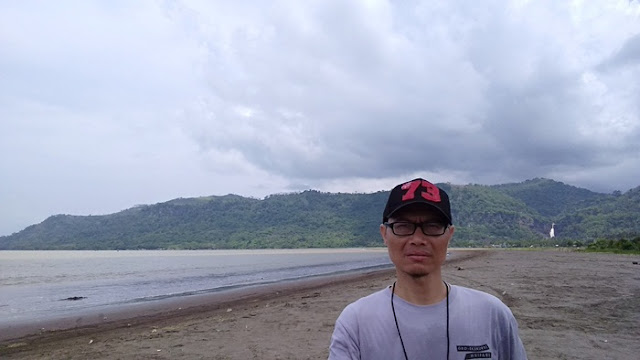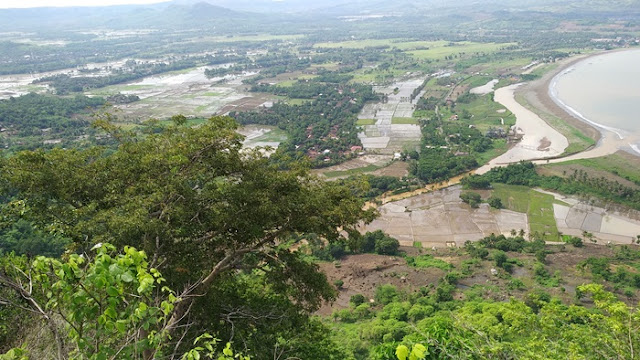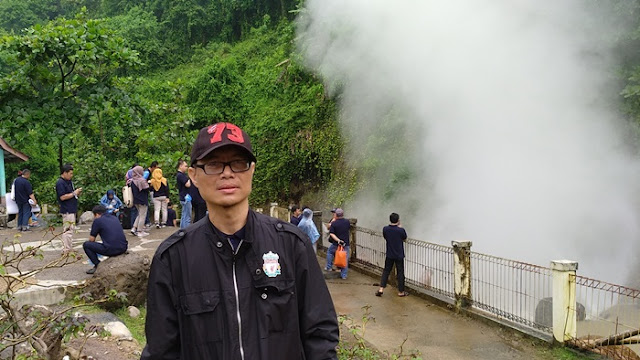Ciletuh-Palabuhanratu
Geopark is located in Sukabumi Regency, West Java Province ,
Indonesia
The
Geopark has an area of 1,261 km2 covering 74 (seventy-four) villages in 8 (eight)
districts: Ciracap, Ciemas, Surade, Waluran, Simpenan, Cikakak, Cisolok, and
Palabuhanratu. This area can be reached by driving a car from Jakarta
to Palabuhanratu, the capital city of Sukabumi Regency ,
as the gateway to the northern part of the geopark region.
Based
on characteristics of geodiversity, biodiversity and culture diversity, the
Ciletuh-Palabuhanratu Geopark can be divided into 3 (three) development area
namely: Southern area, include Surade, Ciracap, partly Ciemas and partly
Waluran districts. The central area covering Simpenan, partly Ciemas, and
Waluran districts. And northern area covering Cisolok, Cikakak, and
Palabuhanratu districts.
Ciletuh-Palabuhanratu
Geopark is designated as an international geopark because it has an
international and geological heritage. Its existence is very rare and becomes
part of the evolution of the earth.
One
of the geological heritage is the oldest rock complex in West Java
as the evidence of a subduction process between the Eurasian continental plate
and the Indian Ocean plate that occurred during the
Cretaceous period (> 65 million years ago). This rock complex is located in Mandrajaya
Village
There
is also a horseshoe-shaped amphitheater that opened to the Ciletuh
Bay Tamanjaya
Village
Another
is geysers and hot spring that spouts continuously in the Cisolok River flow
with temperatures ranging from 40-98 C with varying height up to 5 (five) meters,
as well as travertine deposits (CaCO3 calcite). At the same river flow in
Cisukarame area, there are also some hot springs ,
sinter deposits, fumaroles, and hot mud. This phenomenon shows the existence of
magma activity in depth, as well as the geothermal potential that can be
utilized for friendly environmental energy resource.
In
addition to the mentioned above, 3 (three) outstanding geological heritage
sites, there are also many geological objects of national and local scale in
the geopark region, ranging from rock types, fossils, caves, waterfalls,
beaches and islands of exotic shapes and ancient animal-shaped rocks.
The
geological diversity in the southern part of geopark region is evidence of rock
produced by subduction processes (collisions between continental plates and
oceanic plates) that deposited in the very deep trench. Those rocks later are
uplifted to the surface and known as mélange complex which can be seen in the
southern part of the geopark region particularly within the Cikepuh Wildlife
Reserve and Cibanteng Nature Reserve in Mandrajaya
Village
In
Cikepuh area can be seen the oldest rock complex in West Java which formerly
came from the outermost layer of the earth’s mantle on the ocean plate, the
ophiolite group (peridotite, gabro, anortosit, basal Java) and deep-sea
sedimentary rocks such as chert. In this location is also found metamorphic
rocks produced due to the collision process between the plates namely schist,
phyllite, amphibolite and serpentinite and quartzite.
In
the coastal area of Cikepuh region, there are unique geological objects in the
form of ancient animals shaped-rocks such as frog stone, rhinoceros stone,
dragon stone, crocodile stone, komodo stone, turtle stone, and buffalo stone. In
addition, there are other unique shaped-rock such as a toppled fence, batik
patterned, alien head, and sea cave. All of the shaped-rocks are produced by
the geological processes of erosion, aberration and weathering that occurs in
the outcrops of Eocene sedimentary rock of Ciletuh formation.
In
the Gunung Badak area can also be seen the existence of mixed rock (mélange) that
resembles polimic breccia which is a mixture of oceanic and continental plates
constituent that deposited in the very deep trench formed during the collision
between the plates. In the mélange complex can be found all types of rocks
ranging from ophiolite, metamorphic rocks, igneous rocks of continental plates
and sedimentary rocks that are deposited later on the trench such as
conglomerates sandstone and tuffaceous sandstone and sedimentary breccia. In
this location also can be observed sea cave and the exotic form of Kunti
Island
Some
of the most beautiful beach areas are located in the southern region such as Palangpang
Beach Cikadal
Beach Legon
Pandan Beach Batununggal Beach Cikepuh Beach Cibulakan Beach Ombak Tujuh
Beach Citirem
Beach Pangumbahan
Beach Ujunggenteng
Beach Muara
Cikarang Beach Ombak Tujuh
Beach
In
the middle part of the geopark region, the outstanding geological heritage is
the mega-amphitheatre landscape located in Ciemas district. It also has a
highland landscape which is called Jampang Plateau. From this highland, there
are some interesting viewpoints to see the beauty and splendour of the
amphitheatre and several waterfalls on some of its walls and the green
stretches of rice fields in the valley as well as the green of conservation
forest in the Cipeucang area.
Some
waterfalls that can be observed along the walls of this amphitheatre are
Cimarinjung Waterfall, Sodong Waterfall, Cikanteh Waterfall, Ngelai Waterfall,
Cikaret Waterfall, Puncak Waterfall, Awang Waterfall and Tengah Waterfall.
The outstanding geological sites in the northern part of geopark is the
occurrences of geysers or spouting hot springs Cisolok River which is a rare
geological phenomenon even in Indonesia hot springs





















